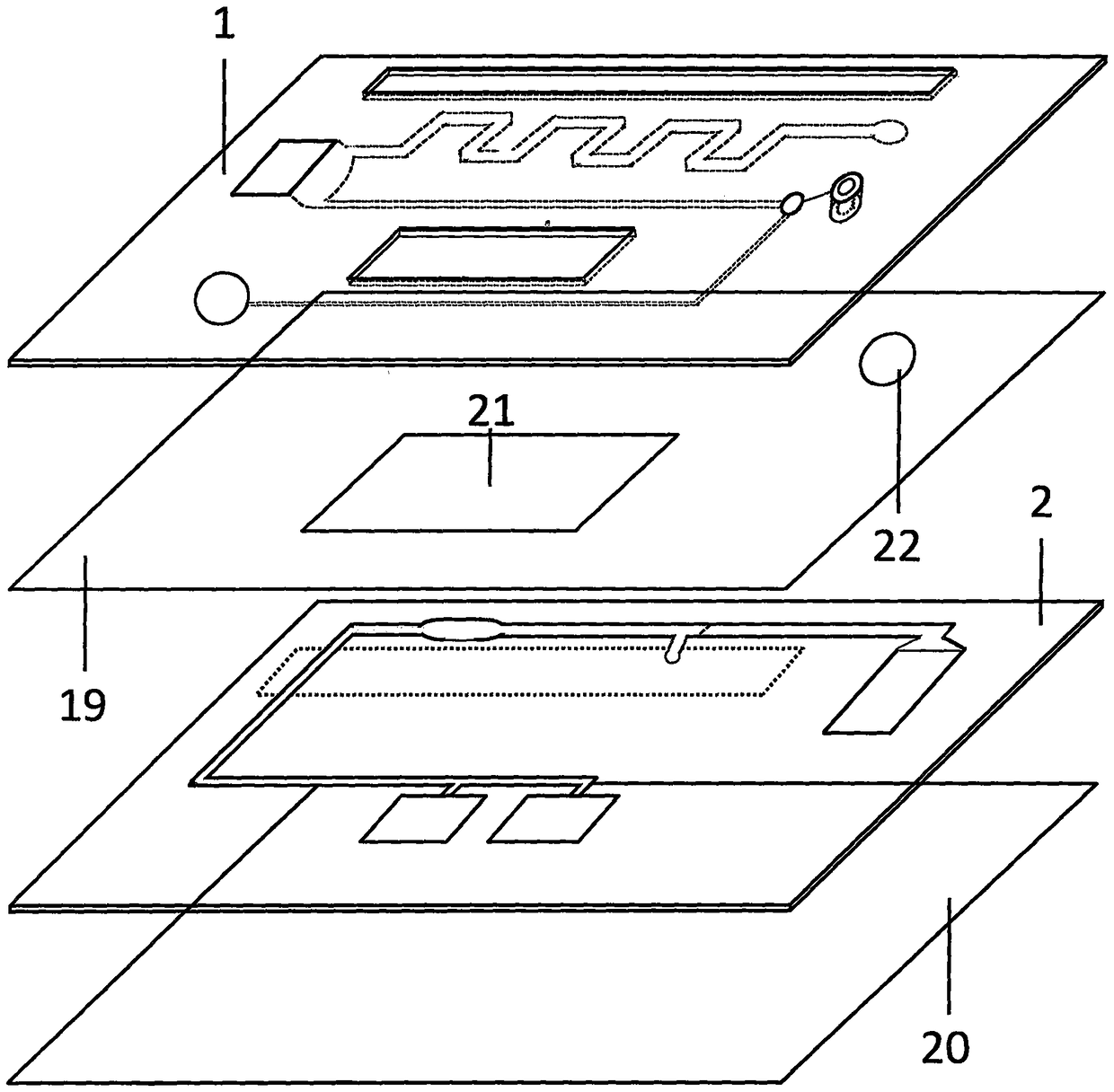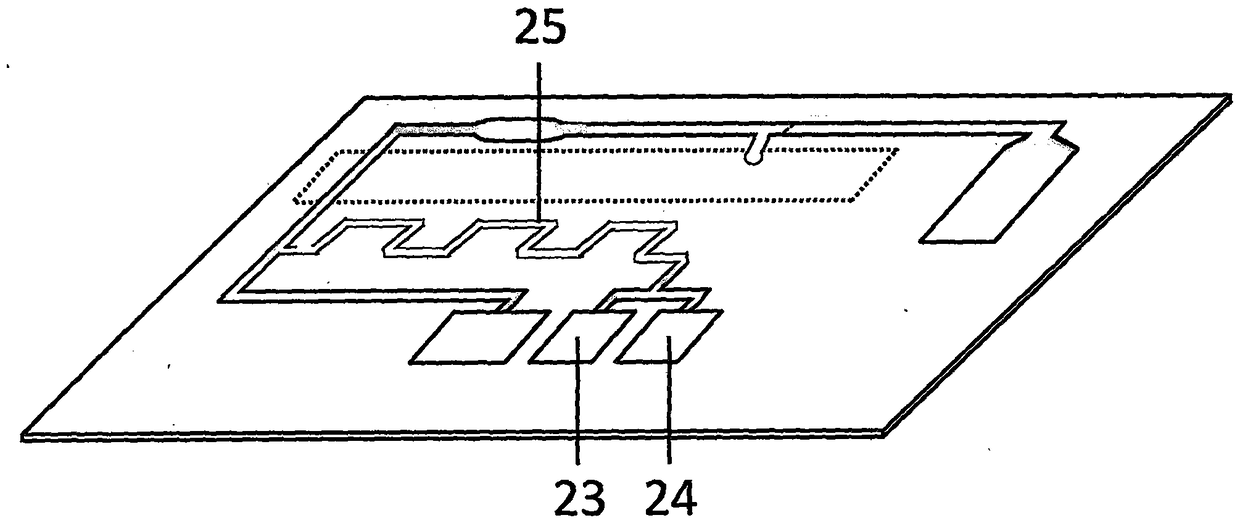Magnetic particle chemiluminescent microfluidic chip for detection of creatine kinase isozyme in whole blood
A microfluidic chip and creatine kinase technology, applied in the field of CK-M, can solve problems such as poor repeatability, interference, and long detection time
- Summary
- Abstract
- Description
- Claims
- Application Information
AI Technical Summary
Problems solved by technology
Method used
Image
Examples
Embodiment 1
[0062] Example 1: Enzymatic chemiluminescent assay of CK-MB
[0063] (1) Antibody labeling
[0064] Dissolve 5 μg of HRP in 1 mL of distilled water, then add 0.2 mL of 0.1 M freshly prepared NaIO 4 The solution was reacted at room temperature in the dark for 20 minutes, and the purified solution was dialyzed against 1 mM pH4.4 sodium acetate buffer. Then adjust the pH to 9.0 with 0.2M pH9.5 carbonate buffer, add 10 μg of anti-CK-MM monoclonal antibody, and react at room temperature for 2 hours in the dark. Add 0.1mL freshly prepared 4mg / mL NaBH 4 solution, mixed well, and reacted at 4°C for 2h. The above solution was put into a dialysis bag, dialyzed against 0.15M pH7.4PBS, overnight at 4°C, and the HRP-labeled CK-MM antibody was obtained.
[0065] Add 1 mg of magnetic particles (directly 2 μm), 10 μg of EDC and 15 μg of NHS solution and 10-30 μg of anti-CK-BB monoclonal antibody (different from HRP-labeled antibody) solution to the phosphate buffer solution, mix well and ...
Embodiment 2
[0076] Example 2: Direct chemiluminescent assay of CK-MB
[0077] (1) Antibody labeling
[0078] Add an appropriate amount of activated acridinium ester and 100 μg anti-CK-BB monoclonal antibody solution to the phosphate buffer, mix well and react at room temperature for 4 hours, and add 1 mg glycine to block. After dialysis, an acridinium ester-labeled CK-BB antibody was obtained.
[0079] Add 1mg magnetic particles (diameter 1μm), 10μg EDC, 15μg NHS solution and 20μg streptavidin to 1ml 10mM pH7.4 phosphate buffer, mix well and react at room temperature for 4h, add 1mg glycine to block. Enrichment by magnet adsorption to remove unreacted streptavidin to obtain magnetic particle-labeled streptavidin.
[0080] Add 10 μg of anti-CK-MM monoclonal antibody to 5 μL of 0.25 mg / mL Sulfo-NHS-LC-biotin solution, and react for 1 h. Purify with an ultrafiltration centrifuge tube to remove unreacted biotin. A biotinylated anti-CK-MM antibody was obtained.
[0081] Through the intera...
Embodiment 3
[0091] Example 3: Magnetic Particle Size Screening
[0092] Refer to Example 2 for other experimental conditions, and the magnetic particle size and magnetic induction of the magnet are carried out according to the following scheme.
[0093] The particle size is 0.1 μm, 0.5 μm, 1 μm, 3 μm, 10 μm. The magnetic induction of the magnet is 500 Gauss, 1000 Gauss, 4000 Gauss, 8000 Gauss, 12000 Gauss. Magnetic particles of five sizes are respectively driven by the five kinds of magnets.
[0094] The experimental results show that when 0.1 μm magnetic particles are combined with 500 Gauss magnets, the chemiluminescent signal is weak and the sensitivity is not high; while when 10 μm magnetic particles are combined with 10000 Gauss magnets, the signal of negative samples is high and the linear range is not wide.
[0095] According to the above results, the size of the magnetic particles is preferably 1-3 μm, and the magnetic induction of the magnet is preferably 1000-8000 Gauss.
PUM
| Property | Measurement | Unit |
|---|---|---|
| size | aaaaa | aaaaa |
| size | aaaaa | aaaaa |
| magnetic flux density | aaaaa | aaaaa |
Abstract
Description
Claims
Application Information
 Login to View More
Login to View More - R&D
- Intellectual Property
- Life Sciences
- Materials
- Tech Scout
- Unparalleled Data Quality
- Higher Quality Content
- 60% Fewer Hallucinations
Browse by: Latest US Patents, China's latest patents, Technical Efficacy Thesaurus, Application Domain, Technology Topic, Popular Technical Reports.
© 2025 PatSnap. All rights reserved.Legal|Privacy policy|Modern Slavery Act Transparency Statement|Sitemap|About US| Contact US: help@patsnap.com



